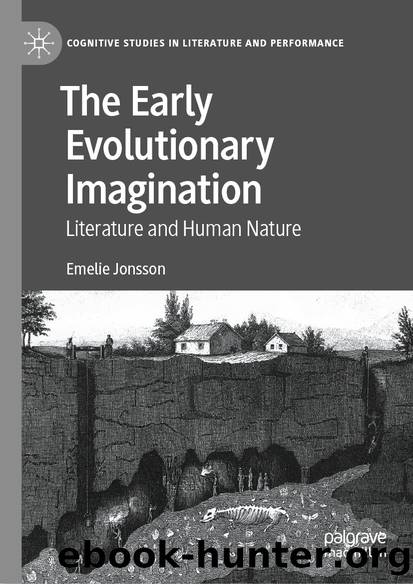The Early Evolutionary Imagination by Emelie Jonsson

Author:Emelie Jonsson
Language: eng
Format: epub
ISBN: 9783030827380
Publisher: Springer International Publishing
Londonâs mythologization of naturalistic cosmology was more conscious than that of most Victorians. He openly declared that he was departing from the truth in order to tolerate life and find his way through it. However, his position was based on a truth that was half falsehood. As he faced his naturalistic vision, he was passionately and plausibly urged away from it by his moral emotions. In the same way, because his character and life compelled him to confront realities, he was irked by averting his eyes from the reality of cosmic injustice.
The moral vision in conflict with Londonâs naturalism was consistently associated with culture. From a young age, he claimed to have glimpsed the cultivated world through literature and associated it with âunselfishness of the spirit, clean and noble thinking,â âall that was fine and noble and gracious, all that gave decency and dignity to lifeâ (1999 [1906], 88). When he found the real cultivated world full of âmonstrous selfishness and sodden materialism,â it strengthened his division between reality and morality (1999 [1906], 94). He became a revolutionary socialist; he aimed to âtoppleâ the society that had disappointed him and to create a ânew habitation,â where man could âprogress upon something worthier than his stomachâ (94). From that point on, the revolution was his âethical romanceâ and âHoly Grailâ (93). Though he claimed to be essentially focused on âthe PEOPLEâ in this endeavor, he admitted that they were for him an essentially imaginative ideaâa âradiant, flashing visionââand that his fellow warriors were the socialist intellectuals among them: âkeen-flashing intellects and brilliant witsâ (1982 [1913], 1066; 1999 [1906], 91). Political idealism had replaced the moral idealism initially associated with cultivated society, but they were both pursued through culture, and conceived as forces of culture in conflict with the natural world.
Londonâs socialism was in direct combat with cosmic injustices: âFATE,â âhardshipsâ and âaccidents,â and the powers in society that left some people more vulnerable than others to such injustices (1982 [1903]-b, 1118). When he wrote up his muckraking experience of the East End of London, he set socialist reform openly against his naturalistic vision, and couched it in religious terms:The application of the Golden Rule determines that East London is an unfit place in which to live. Where you would not have your own babe live, and develop, and gather to itself knowledge of life and the things of life, is not a fit place for the babes of other men to live, and develop, and gather to themselves knowledge of life and the things of life. It is a simple thing, this Golden Rule, and all that is required. Political economy and the survival of the fittest can go hang if they say otherwise. (1982 [1903]-a, 125)
Download
This site does not store any files on its server. We only index and link to content provided by other sites. Please contact the content providers to delete copyright contents if any and email us, we'll remove relevant links or contents immediately.
| Administration & Medicine Economics | Allied Health Professions |
| Basic Sciences | Dentistry |
| History | Medical Informatics |
| Medicine | Nursing |
| Pharmacology | Psychology |
| Research | Veterinary Medicine |
Bioenergetica by Alexander Lowen(1475)
The Child in You by Stefanie Stahl(1270)
No Bad Parts by Richard C. Schwartz(1254)
Noise: A Flaw in Human Judgment by Sunstein Cass R. & Sibony Olivier & Kahneman Daniel(1192)
The Data Detective by Tim Harford(1137)
Chatter by Ethan Kross(1072)
The Science of Rapid Skill Acquisition by Peter Hollins(924)
The Quantum Psychiatrist: From Zero to Zen Using Evidence-Based Solutions Beyond Medication and Therapy by Biswas Dona(881)
Freedom by Sebastian Junger(861)
The Montessori Baby by Simone Davies(859)
Maps of Meaning: The Architecture of Belief by Jordan B. Peterson(752)
The Science of Self-Learning: How to Teach Yourself Anything, Learn More in Less Time, and Direct Your Own Education (Learning how to Learn Book 1) by Peter Hollins(749)
Evolution Gone Wrong: The Curious Reasons Why Our Bodies Work by Alex Bezzerides(709)
Sadomasochism and the BDSM Community in the United States by Stephen K. Stein(696)
Anxiety For Dummies by Charles H. Elliott & Laura L. Smith(673)
Disconnected by thomas Kersting(665)
Why Sex Doesn't Matter by Olivia Fane(664)
The Mechanics of Passions: Brain, Behaviour, and Society by Alain Ehrenberg(635)
Jung - The Key Ideas: Teach Yourself (TY Philosophy) by Ruth Snowden(629)
